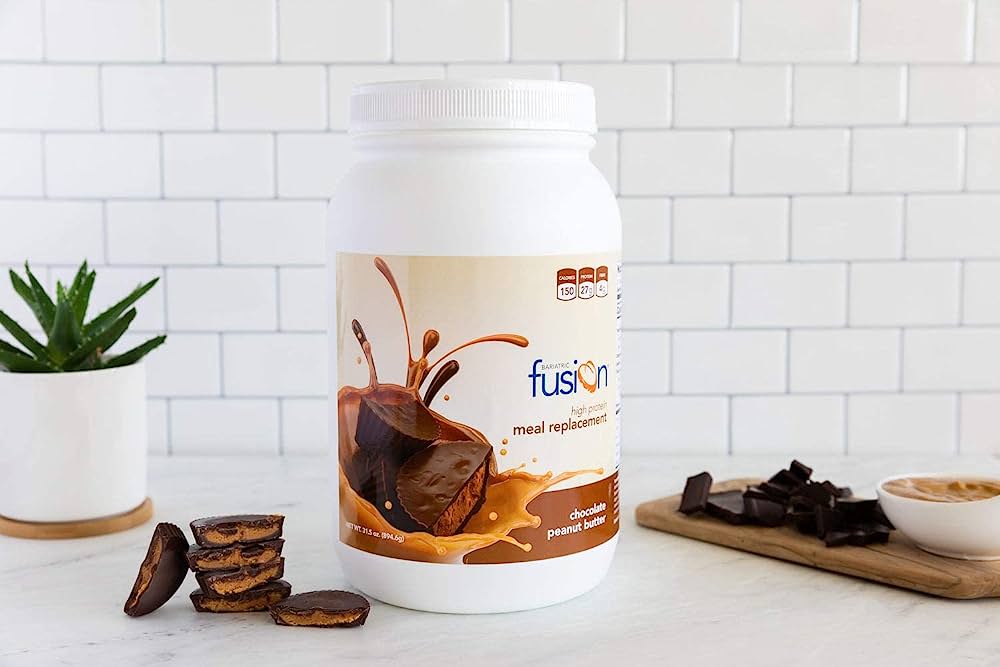
Harshalee Parkar
Bariatric Dietician & Content Writer

5 Best Bariatric Protein Powder (Post Bariatric Surgery)
When it comes to better health and independence from obesity, bariatric surgery is an essential step. Once the surgery is complete, you must stay committed to a Balanced diet plan in order to give your new stomach time to adjust to regular food.
Proteins are the fundamental building blocks of life. Protein is found in every cell of the human body. It is required in your diet to assist your body in cell repair and cell growth. Because your calorie intake is reduced after bariatric surgery, it is critical that you get the majority of your calories from proteins.

Bariatric Protein Powders –
Bariatric surgery is a life-changing treatment that can help people lose a significant amount of weight by making changes to their digestive tract. However, Protein benefits your body in a variety of ways following surgery. It aids in the maintenance and growth of muscle mass, which is necessary for weight loss. If your body cannot obtain enough protein from outside sources (diet), it will break down even more muscle mass to compensate.
Protein also aids in wound healing and, as a result, aids your body’s recovery from surgery. Other benefits of protein consumption include healthier skin, hair, and nails, as well as improved immunity. When you eat protein-rich foods, you will feel fuller for longer periods of time and will not be hungry between meals.
Here, we’ll go over the various forms of protein powder, its benefits and drawbacks, and provide some specific recommendations for bariatric patients.
Types of Bariatric Protein Powders -
1) Whey Protein Powder -
One of the most popular proteins found in bariatric protein shakes is whey protein, which is actually a byproduct of the cheesemaking process and comes from the liquid byproduct of milk. After being strained, concentrated, and dehydrated, this protein-rich liquid becomes whey protein powder. Whey protein is a popular protein supplement for bariatric patients because of its high biological value and digestibility, and it is available in a variety of forms, including concentrate, isolate, and hydrolysate.
Pros: Whey protein’s high biological value is due in large part to the fact that it provides all nine of the essential amino acids that our bodies need but cannot produce. In addition, it contains a high concentration of BCAAs, which are essential for promoting muscle development and repair. When your muscles need immediate nourishment after a workout, whey protein is a great choice because it is quickly absorbed by the body. Whey protein has been shown to have potential health benefits including enhanced immune function, aided weight loss via increased satiety, and normalized glucose levels.
Cons: Despite its many benefits, whey protein may not be suitable for everyone. Those with lactose intolerance or milk allergies may experience digestive discomfort or allergic reactions due to the presence of lactose and milk proteins. Additionally, whey protein is not a vegan-friendly option, as it is derived from an animal source.
2) Casein Protein Powder -
Definition and sources: Casein, another protein commonly found in bariatric shakes, is a milk-derived protein that accounts for roughly 80% of the protein content in cow’s milk. Casein coagulates and forms curds during the cheese-making process, whereas whey remains a liquid. Casein protein powder is made by extracting and drying the protein from these curds. Casein protein powder is available in two primary forms: micellar casein and casein hydrolysate.
Pros: One of the key advantages of casein protein for bariatric patients is its slow-release property. Unlike whey protein, casein forms a gel-like substance in the stomach, which takes longer to digest. This slow digestion rate results in a steady supply of amino acids to the muscles over an extended period, making it an ideal choice for nighttime use or between meals to help maintain muscle mass and prevent muscle breakdown. Additionally, casein protein can keep you feeling fuller for longer periods due to its slower digestion, potentially aiding in weight management.
Cons: Similar to whey protein, casein is not suitable for lactose intolerant individuals or vegans, as it is derived from milk. Its slower digestion rate, while advantageous in some situations, may not be ideal for those who require immediate protein absorption, such as during post-workout recovery.
3) Soy Protein Powder -
Definition and sources: Soy protein powder is made from defatted soybean flakes that have had the majority of the fat removed. The remaining protein-rich flakes are then ground into a fine powder, providing bariatric patients with a plant-based alternative to animal-derived proteins. Soy protein powders come in a variety of forms, including soy protein isolate, soy protein concentrate, and textured soy protein.
Pros: Soy protein is a popular choice for bariatric vegans and vegetarians, as it is entirely plant-based. It is low in fat and contains all nine essential amino acids, making it a complete protein source. This quality sets it apart from many other plant-based protein options. Soy protein is also a good source of vitamins, minerals, and antioxidants, providing additional health benefits beyond just protein intake. Research has shown that soy protein may help lower cholesterol levels, support heart health, and aid in muscle recovery and growth.
Cons: While soy protein offers numerous benefits, it may not be the best choice for everyone. Some individuals may experience gastrointestinal discomfort, such as bloating or gas, when consuming soy protein. Moreover, soy contains phytoestrogens, plant compounds that can mimic the hormone estrogen. Although research on the effects of phytoestrogens is still inconclusive, some individuals may prefer to avoid soy protein due to potential hormonal impacts.
4) Pea Protein Powder -
Definition and sources: Pea protein powder is derived from yellow split peas, providing another vegan-friendly protein option for bariatric patients after weight loss surgery. This plant-based protein is extracted from the peas through a process that removes the starch and fiber, leaving a concentrated protein source.
Pros: Pea protein is easily digestible, making it an attractive option for bariatric patients who may experience digestive issues after weight loss surgery. It is also hypoallergenic, meaning it is less likely to cause allergic reactions and is a good choice for those with dietary restrictions or sensitivities. Additionally, protein can lower levels of ghrelin, the hormone responsible for stimulating feelings of hunger, which can be beneficial for weight loss. As a plant-based bariatric protein option, pea protein is suitable for vegans and vegetarians and has a lower environmental impact compared to animal-based protein sources.
Cons: Pea protein is not ideal because it is incomplete; it does not contain all nine essential amino acids. Pea protein alone does not provide a full complement of amino acids, but it can be supplemented with other plant-based proteins like rice protein to make up the difference. It’s possible that pea protein is more costly than alternatives. Furthermore, the taste and texture of pea protein powder may not be to everyone’s liking, so individual preferences should be taken into account when selecting a protein source following weight loss surgery.
5) Rice Protein Powder -
Definition and sources: Rice protein powder, typically made from brown rice, offers another plant-based protein option for bariatric patients. Through a process that involves extracting the protein from the rice, the result is a concentrated protein source that can be used in protein shakes after weight loss surgery.
Pros: Similar to pea protein, rice protein is vegan-friendly, easily digestible, and hypoallergenic. This makes it a suitable option for bariatric patients with dietary restrictions, allergies, or sensitivities. Its digestibility is particularly important for those who have undergone weight loss surgery and may have difficulty digesting other protein sources. Rice protein also boasts a mild flavor and smooth texture, making it a versatile ingredient for bariatric protein powders and shakes. One lab study suggests that brown rice protein is better than white rice protein and soy protein for controlling weight gain.
Cons: Rice protein is not a complete protein, as it lacks some essential amino acids. However, this drawback can be addressed by combining rice protein with other plant-based protein sources, such as pea protein, to create a complete amino acid profile. Rice protein may also be more expensive compared to other protein sources, especially when searching for high-quality, organic, or non-GMO options.







